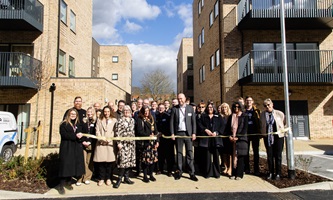Why our social purpose is more important than ever
Gavin Cansfield, chief executive

The drama at Westminster may be continuing. But we now have certainty that, under the newly elected Conservative government, Brexit will proceed in 2020 as outlined by the prime minister.
What this all means for the social and affordable housing landscape remains to be seen.
In its manifesto, the Conservative Party promised a Social Housing White Paper. Boris Johnson also committed to delivering new policies on shared ownership and homes for first-time buyers. While this policy context is important to what we do as housing providers, there is plenty more going on in all our daily lives.
Many of the major concerns for our customers and communities are much closer to home. It is at this local level that housing associations can make a big difference.
We call it our social purpose, and it is why we love working in social housing; we provide low-cost, good-quality homes for people unable to pay more. Our latest strategy (2020-24) sets out our commitment to build 1,500 affordable homes – double what we are doing at present. We continue to increase investment in our existing homes: £2.7m in 2017/18, £3.8m during 18/19, and £7.5m this year. We will do all of this in partnership with the government and Homes England to help deliver their aims of providing more and better homes.
Housing associations are also social businesses; we care about the people who live in our homes.
At settle, our goal is for customers to live comfortably and live the life they choose.
This is what our social-purpose strategy is all about. We work with our customers to understand how we can support them to achieve their goals in life. We make a surplus each year – a ‘profit for a purpose’ in the jargon. But what is this purpose if it isn’t to explore how we can work with the people who paid the rent to generate that surplus in the first place? So, what are we doing?
First, we are working to address loneliness in our communities – both among younger customers as well as older people. We were already acting on this issue, but our recent ‘big door knock’ reinforced our view that there is more we can do. The range of needs and contexts is vast, but the want of human companionship is a common denominator. As a business, we cannot hope to help everyone on an individual basis, but we do have the opportunity to inspire communities to help themselves. One such initiative we are exploring is Compassionate Neighbours. There are some brilliant videos here of the outcomes from what they do. In essence, they connect people suffering from loneliness, regardless of their circumstances.
We see a real opportunity to apply this approach to bringing together lonely older and younger people in our communities. Older people have a wealth of knowledge, experience, and life skills, but often lack an opportunity to share them. Younger customers may have more limited experience and life skills but often have the energy and enthusiasm to help in other ways. We bring old and young together through our mentoring scheme. Colleagues say these relationships can benefit both age groups and improve wellbeing, reduce rent arrears, and cut anti-social behaviour. It may sound a little fanciful, but why not give it a try?
Second, we are pioneering some of the work being done with local professionals – including with the Community Mental Health Forum – to ensure customers needing help are not passed from pillar to post. This helps us to join the dots to ensure a quick, coordinated, effective effort.
Third, we are really excited by the potential of our Foundations 4 Work project in partnership with the local Hertfordshire charity, Create Community Network. This supports people to get into sustainable, paid employment. There are three key aspects to it:
- A dedicated one-to-one mentor (paid for by settle) who supports tenants to develop and follow a skills-and-employment action plan
- Training to ensure people have the skills they need
- Engagement with employers large and small that support the programme through the provision of work experience and employment opportunities
This is just a flavour of some of the work we are doing to ensure we fulfil our social purpose to support our communities to be great places to live.
The national political debate will, of course, continue to be dominated by Brexit. But in the meantime, as housing professionals, we can focus on the day-to-day challenges our customers face.
Article first published in 24Housing.


